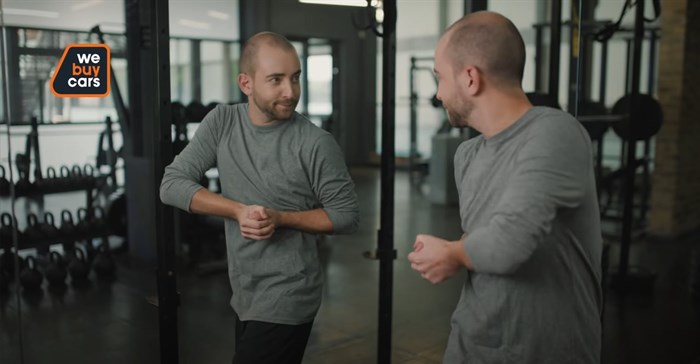#OrchidsandOnions: Ad with some muscle

Years ago, a road race I took part in ended at a Health & Racquet Club somewhere in the Joburg northern suburbs. I remember little of the race but was struck by the number of buff, muscular posers (male and female) going into or leaving the gym.
Every time they walked past a large window or mirror, these gods of beauty could not resist a glance at their own awesomeness.
That reminded me of why my chosen form of exercise was hitting the road in running shoes: I could never go through a fitness routine at a place where the women had bigger biceps than me. (In my defence, in my days as a triathlete, I beat many muscle-bound Adonises - because it’s not about muscle bulk, it’s about how you use it.)
That is why I had more than a little smirk at the latest ad for used-car site operation We Buy Cars.
I could instantly identify with the non-body builder type as he tried to train near the Incredible Hulk, who would occasionally glance over with a mixture of mocking and pity.
The whole scenario is turned on its head, though, when the two gym bunnies head out to the car. Small guy goes to macho Ford Ranger and Power Lifter Pete is forced to duck behind his own Kia Picanto to avoid the “size does count” comparison.
Then, up pops the We buy Cars punchline: Too much muscle for your motor? Big or small, we buy them all.
The next scene shows the bodybuilder handing over his keys to his car’s new owner.
It’s humorous because it plays on the stereotype, but that’s why it’s effective – because it puts a spin on things. And it gets an Orchid from me.
Swindle and con
In cyberspace, no one can see the scams – that’s why the internet is such a rich picking ground for fraudsters and those who bend the truth to suit a narrative.
A few years ago, I had a go at a Joburg company that claimed it had got hundreds of millions of “interactions” based on tweets from an activation where members of the public could tweet to win something. There were only about 100 who took part. Yet each one of them attracted a million “interactions” each over the course of about three days? I don’t think so.
My cynicism and general mistrust of internet marketing not-withstanding, I’m ashamed I got taken in by a bunch of con artists doing clever marketing through Twitter. I thought that Vanessa Smith, a mom and freelance writer from Cape Town (so it said in her Twitter bio), was a great word-of-mouth way of spreading a message about “gap cover” insurance for medical aid shortfalls.
The problem was – she doesn’t exist. And the pic of her was lifted from a stock shot agency.
I am immensely grateful, therefore, to Andrew Fraser, a switched-on Joburg expert in matters of market and data analysis.
Fraser, obviously an adept net sleuth, laid bare the tale of the fake Vanessa – and tracked down a number of other fake people who were being used in a similar way to punt insurance products through seemingly honest and believable tweets.
He traced multiple accounts on Twitter – all fake and all looking like sleazy ways of picking up insurance leads. Sites linking them included coversearch.co.za and healthcompare.co.za.
Further into the investigation, Fraser found everything linked back to a Cape Town marketing company, Online Media Guys.
It’s a salutary reminder that everything is not nearly as it may seem in the online world. Hats off – and an Orchid – to Fraser for shining a light into the murky, dishonest parts of the net.
But a huge crop of Onions for Online Media Guys. Why the dishonesty, people? Makes me wonder how I can rely on anything you link to or recommend.




































